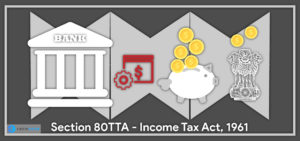Deduction on Interest under Section 80tta of Income Tax Act
Section 80TTA – Income Tax Act, 1961
The Income Tax Act, 1961 is the charging statue for income tax. Its functions are to levy, collect, administer and recover income tax. Section 80TTA was inserted by Act 23 of 2012, (w.e.f 01-014-2013), in Income Tax Act, 1961. This section is about claiming deduction on interest. This section provides for different conditions on which a deduction can be allowed.
Section 80TTA reads as follows:
Bare provision
(1) Where the gross total income of an assessee, being an individual or a Hindu undivided family, includes any income by way of interest on deposits (not being time deposits) in a savings account with—
(a) a banking company to which the Banking Regulation Act, 1949 (10 of 1949).
(b) a co-operative society engaged in carrying on the business of banking; or
(c) a Post Office as defined in clause (k) of section 2 of the Indian Post Office Act, 1898 (6 of 1898),
there shall, in accordance with and subject to the provisions of this section, be allowed, in computing
the total income of the assessee a deduction as specified hereunder, namely
(i) in a case where the amount of such income does not exceed in the aggregate ten thousand rupees, the whole of such amount.
(ii) in any other case, ten thousand rupees.
(2) Where the income referred to in this section is derived from any deposit in a savings account held by, or on behalf of, a firm, an association of persons or a body of individuals, no deduction shall be allowed under this section in respect of such income in computing the total income of any partner of the firm or any member of the association or any individual of the body.
Explanation.—For the purposes of this section, ―time deposits‖ means the deposits repayable on
expiry of fixed periods.
Explanations to Bare Provision
Subclause 1
- Subsection 1 of Section 80TTA talks about the other income of the assessee. Other income includes all such income which is earned through the interest on any deposit. Moreover, such other income must be earned in a savings account with any bank or any co-operative society. It also includes a savings account with the Post office. Whereas, It excludes any kind of time deposit. Further, the time deposit here refers to such deposits which are repayable after a certain period of time. Means, interest earned under time deposits are not deductible. Hence, when the gross total income of an assessee includes other incomes earned in a savings account with any bank or any co-operative society or post office; such incomes are deductible as per the provision of this act.
- Further, After satisfying the above condition i.e when an individual or a Hindu undivided family has a saving account with the above-mentioned banks. Such other incomes are deductible from the total income of the assessee. Provided that, such deductions are subject to the provisions of this act. Also, such deductions are not unlimited by nature. This Act puts a cap on the limit of deduction. Hence, in a case where such other incomes do not exceed the limit of ten thousand, in such cases the whole amount is deductible. And, where the income of the assessee exceeds ten thousand, in such case up to the limit of ten thousand is deductibles. This means the act does not allow a deduction of more than ten thousand.
Subclause 2
Subclause 2 of section 80TTA provides for the exception. It talks about the individual or body of individuals who are not eligible for deduction. This clause has a negative approach as it excludes certain deduction from the ambit of this act. Hence, any income which is earned from deposits in such savings accounts as mentioned above is not deductible, if the holder of such savings account is an association of people or a body of individuals of a firm. While computing the total income of any partner of the firm such incomes are not deductible. Moreover, it excludes the income of an association of people or bodies of individuals.
Conclusion
This section provides a little relaxation while filling the income tax return. This section does not affect much the return of a businessman. Whereas, it is very handy for those who have low incomes or operate on a small scale. This act also provides for other kinds of deduction. Introduced in 2012, this section is the latest one. The objective of providing such a deduction is simple. When an individual is investing with the government, it somehow helps the government in executing its functions. However small an amount may be. So with the introduction of this section in 2012, the Government granted deduction on a limited amount.
Relevant Case laws
-
Hindustan colas ltd, Mum v. Assessee[1]
“80A(5)-Where the assessee fails to make a claim in his return of income for any deduction under section 10A or section 10AA or section 10B or section 10BA or under any provisions of the Chapter VIA under the heading “C” — Deductions in respect of certain incomes,” no deduction shall be allowed to him.” All such provisions of VIA apply to the section from 80HH to 80TTA
[1]- ITA No. 3981/Mum/2008
Read More – Differences Between Direct And Indirect Tax
Try our Debt Resolution solutions today Request a Demo
